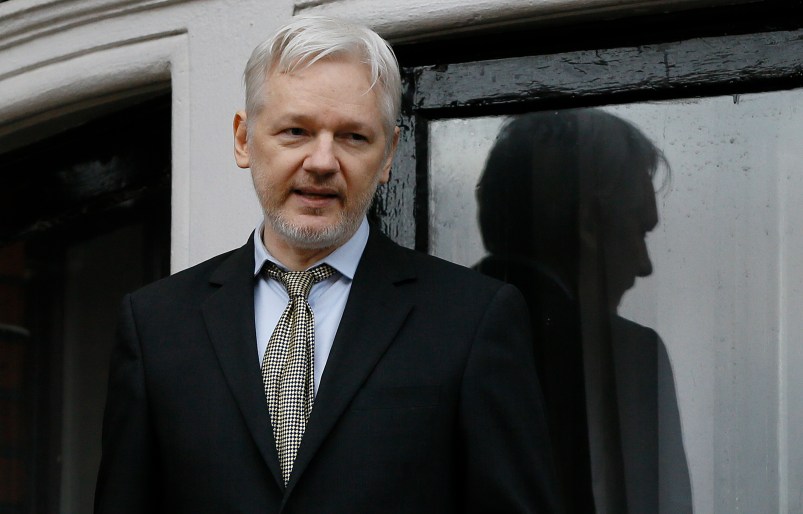STOCKHOLM (AP) — A Swedish appeals court on Friday upheld a detention order for WikiLeaks founder Julian Assange, dismissing the latest attempt by the 45-year-old Australian to make prosecutors drop a rape investigation from 2010.
The decision by the Svea Court of Appeal means that the arrest warrant stands for the 45-year-old computer hacker, who has avoided extradition to Sweden by seeking shelter at the Ecuadorean Embassy in London since 2012.
Assange, who denies the rape allegation, has challenged the detention order several times. He says he fears he will be extradited to the United States to face espionage charges if he leaves the embassy.
His Swedish defense lawyer, Per Samuelson, said he would appeal the decision to the Supreme Court.
“We are naturally disappointed that Swedish courts yet again choose to ignore Julian Assange’s difficult life situation,” Samuelson told The Associated Press. “They ignore the risk that he will be extradited to the United States.”
Swedish prosecutors say they are not in contact with counterparts in the U.S. and that they would also need Britain’s permission should a third country seek his extradition.
Upholding a lower court ruling, the appeals court said Swedish prosecutors are actively trying to move the investigation forward and set up an interrogation of Assange at the embassy. Acting on behalf of Swedish investigators, an Ecuadorean prosecutor is set to question Assange on Oct. 17.
“This means that there is at present no reason to set aside the detention order. Julian Assange’s claim to that effect shall therefore be refused,” the court said.
It also brushed aside the findings of a U.N. working group, which described his stay at the London embassy as “arbitrary detention.” The court noted that the panel’s finding wasn’t binding on Swedish courts and that Assange’s stay at the embassy “is not to be regarded as an unlawful deprivation of liberty.”
The investigation stems from Assange’s brief relationship with two women he met during a visit to Sweden six years ago. Allegations of sexual molestation and unlawful coercion were dropped last year when the statute of limitations expired. The rape allegation, which involves one of the women, will expire in 2020 if Assange hasn’t been indicted by then.
Marianne Ny, the top prosecutor in the case, welcomed the court’s decision and said the interrogation with Assange would go ahead as planned.
“I have handled many rape and sex crimes cases,” she told AP. “I have never experienced before that someone sought shelter at an embassy. So this situation is really unusual.”
___
This story has been corrected to fix the spelling of Per Samuelson’s last name.
Copyright 2016 The Associated Press. All rights reserved. This material may not be published, broadcast, rewritten or redistributed.







I’ve never understood why the Ecuadorian embassy gives him this long term hideout.
What does allowing him to avoid justice and do damage to his chosen enemies in the meantime have to do with anything?
And once he manages, if he does, to run out the clock on the rape charges, he still has to face the US or he’ll be in hiding for eternity.
He’d best leak hard and fast while he can and get his jollies while the gettin’ is good, that’s all I can say.
Well maybe you could start with Human Rights Watch (https://www.hrw.org/americas/ecuador)
“The administration of President Rafael Correa has expanded state control
over media and civil society and abused its power to harass,
intimidate, and punish critics. In 2015, thousands of people
participated in public demonstrations against government policies, and
security forces on multiple occasions responded with excessive force.
Abuses against protesters, including arbitrary arrests, have not been
adequately investigated. Other continuing concerns include limited
judicial independence, poor prison conditions, and the limited access
women and girls enjoy to reproductive health care because of Ecuador’s
harsh laws against abortion.”
And continue here (https://en.wikipedia.org/wiki/Ecuador–United_States_relations)
[excerpt]:
“In April 2011, relations between Ecuador and the United States soured
particularly after Ecuador expelled the U.S. ambassador after a leaked
diplomatic cable was shown accusing president Correa of knowingly
ignoring police corruption. In reciprocation, the Ecuadorian ambassador
Luis Gallegos was expelled from the United States.[7]”
Who do you believe, repressive regimes with grudges against the U.S. and non-state actors who take the law into their own hands or the legal representatives of authentic, advanced democracies like Sweden and the U.K.?
Come on, it’s not difficult.
Thanks for the response but I’m not really getting the question at the end.
I didn’t ask who was more believable, I asked why and you helped me to know why.
I naturally assumed it must be something like this but what I wasn’t sure, hence,
“I’ve never understood why the Ecuadorian embassy gives him this long term hideout.”
I can search as easily as anyone but it’s nice to get perspective from a group that I generally agree with and isn’t just cold data, if you know what I’m saying.